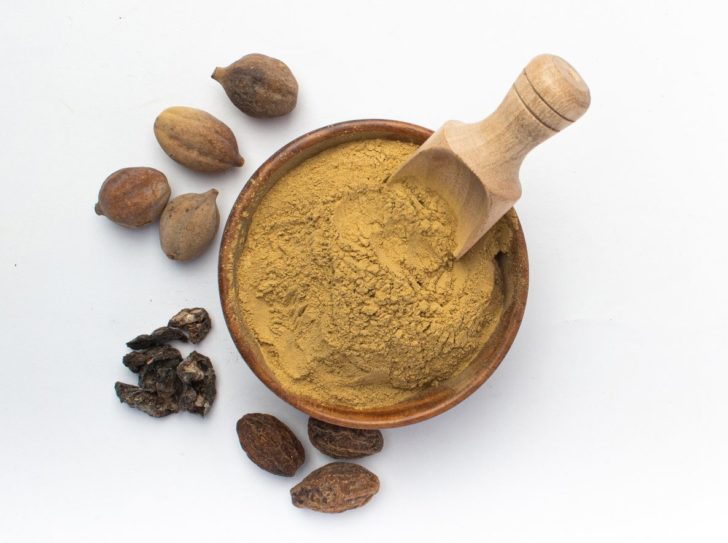Triphala, a powerful blend of three medicinal plants native to India, has been revered in Ayurvedic medicine for centuries. Its diverse health benefits, ranging from combating inflammation to promoting oral health, make it a promising supplement for modern-day wellness seekers. Delve into the fascinating world of Triphala and uncover the secrets behind its potent health benefits.
Table of Contents
Key Takeaways
Triphala is a traditional Ayurvedic remedy composed of three medicinal plants with anti-inflammatory, cancer-protective and immune-enhancing properties.
Potential health benefits of Triphala include combating inflammation, protecting against certain cancers, promoting oral health and aiding weight loss.
It should be taken under the guidance of a healthcare professional as it has potential side effects such as diarrhea or hypoglycemia.
Understanding Triphala: Origins and Components
Triphala, a powerful herbal concoction in traditional Ayurvedic medicine, is one of the dietary supplements made up of three medicinal plants: Terminalia chebula (black myrobalan), Terminalia bellerica (bastard myrobalan), and Phyllantus emblica (emblic myrobalan or Indian gooseberry). The triphala extract is derived from these plants and is widely used in Ayurvedic treatments.
Rich in tannins, gallic acid, ellagic acid, chebulinic acid, and amino acids, Triphala is categorized as a tridoshic rasayana in Ayurvedic medicine, known to help prevent and manage chronic diseases.
Amla: The Vitamin C Powerhouse
Amla, one of the three medicinal plants used in Triphala, is a fruit native to India, known for its high content of vitamin C and minerals. Its wealth of antioxidants, including gallic acid and ascorbic acid, bolsters the immune system and facilitates digestion.
Research has highlighted Amla’s potential benefits, including:
Anti-inflammatory properties
Protective function against specific cancers
Promotion of kidney, liver, and heart health
Defense against the common cold
Bibhitaki: The Inflammation Fighter
Bibhitaki, the fruit of the Terminalia bellirica tree, is another key component of Triphala. It possesses anti-inflammatory properties, as demonstrated in a randomized controlled clinical trial. Bibhitaki extract has been shown to suppress the proliferation of cancer cells in some studies, showcasing its potential health benefits.
Bibhitaki also houses various bioactive compounds which enhance its anti-inflammatory, anti-diabetic, and blood sugar-regulating prowess.
Haritaki: The Digestive Aid
The third component of Triphala, Haritaki, is a plant abundant in compounds like gallic acid, ellagic acid, and chebulinic acid, recognized for their anti-inflammatory and antioxidant properties. Haritaki is effective in treating digestive issues such as indigestion, constipation, and bloating, emphasizing disease prevention in Ayurvedic medicine.
Additionally, Haritaki has the potential to reduce cholesterol levels and improve heart health, which may help in managing chronic diseases such as heart disease. It is also beneficial in reducing inflammation in the lungs and enhancing respiration, making it a potential option in alternative and complementary medicine for treating asthma.
Furthermore, Haritaki can help reduce ulcer-associated discomfort by mitigating inflammation in the stomach and intestines.
Potential Health Benefits of Triphala

Owing to the unique characteristics of its three components, Triphala is a source of numerous potential health benefits. These benefits include:
Combating inflammation
Protecting against certain cancers
Promoting oral health
Aiding weight loss
Triphala is also known to have cardiovascular benefits, with a study revealing that patients treated with a laxative containing isabgol husk, senna extract, and Triphala experienced significant improvements in symptoms of constipation.
Furthermore, Triphala’s anti-aging effects include:
Stimulating collagen-1 and elastin-synthesizing genes
Inhibiting melanin production and hyperpigmentation
Exhibiting significant free radical scavenging activity.
Combating Inflammation and Oxidative Stress
Triphala contains powerful antioxidants that help combat inflammation and oxidative stress caused by free radicals. These antioxidants include:
Vitamin C
Flavonoids
Polyphenols
Tannins
Saponins
Diets high in antioxidants, which emphasize disease prevention, have been linked to a lower risk of heart disease, certain cancers, diabetes, and premature aging. In vitro antioxidant studies support these findings by providing further evidence of the benefits of antioxidant-rich diets.
Triphala’s anti-inflammatory properties have been demonstrated in animal models, showing potential effectiveness in reducing inflammation and damage associated with arthritis. The bioactivity of Triphala is believed to be triggered by gut microbiota, thereby producing a wide range and an increased quantity of anti-inflammatory compounds.
Protection Against Certain Cancers
Triphala’s potential cancer-fighting properties have been demonstrated in various animal studies. While its effects have been observed in these studies, further research, such as a randomized clinical trial, would be necessary to confirm its efficacy in humans. It has been found to inhibit the growth of lymphoma, stomach, and pancreatic cancers in mice, and induce colon and prostate cancer cell death in test-tube studies.
Triphala’s high levels of antioxidants, such as gallic acid and polyphenols, may be responsible for its cancer-fighting properties. Triphala extract suppresses proliferation of cancer cells. Its antineoplastic effect has been observed on many cancer cell lines, including those of the:
Breast
Prostate
Colon
Pancreas
Oral Health and Dental Disease Prevention
Triphala has been found to possess several oral health benefits. It can be utilized as a gargling agent in dental diseases, displaying significant anti-caries activity. Triphala mouthwash has been demonstrated to be effective in controlling plaque and contains a sugar substitute that does not cause tooth decay.
Additionally, its antioxidant, antimicrobial, and anti-inflammatory properties are beneficial for oral health. Triphala may potentially reduce plaque buildup and gum inflammation, thereby preventing dental diseases and cavities.
Weight Loss Support
Research indicates that Triphala may support weight loss by reducing body weight and fat in both animal and human studies. Triphala may offer weight loss benefits, particularly in the abdominal region.
To maximize Triphala’s weight loss potential, it is recommended to add two teaspoons of Triphala powder in a glass of water and drink it on an empty stomach in the morning. Additionally, taking 10g of Triphala powder before breakfast and after dinner can also be beneficial for weight loss.
Precautions and Side Effects of Triphala
Despite the plethora of health benefits offered by Triphala, awareness of possible side effects is necessary. Consumption of large doses of Triphala can result in digestive symptoms such as diarrhea.
It’s also indicated by research that Triphala might lower blood glucose levels by inhibiting the absorption of glucose through glycolytic enzymes.
Triphala is not suitable for children, pregnant or nursing women, and individuals with bleeding disorders. Before commencing Triphala consumption, consultation with a healthcare professional is vital to ascertain its safety and effectiveness.
Learn more, visit Triphala: Uses, Benefits, Side Effects & More!
Triphala Consumption: Forms and Dosage
Available in various forms like capsules, powders, or liquids, Triphala offers flexible consumption options. Triphala taila, an Ayurvedic preparation made by boiling Triphala powder with oil, is utilized as a gargle, snuff, enema, and orally to treat obesity and itching.
To ensure optimal absorption, it is suggested that Triphala be ingested between meals on an empty stomach. When starting Triphala supplementation, it is recommended to begin with a minimal dose and incrementally increase the dosage as required. Before starting a Triphala regimen, it is advisable to consult with a healthcare professional to ensure its safe and effective use.
Triphala’s Impact on Gut Health and Microbiome
Triphala’s phytochemicals may promote the growth of beneficial gut microbes, inhibit harmful ones, and generate anti-inflammatory compounds, potentially enhancing its health benefits.
The phytochemicals in Triphala might help foster the growth of beneficial gut microbes, thereby maintaining a balanced gut microbiome. There is evidence that Triphala has antimicrobial properties, which can help inhibit the growth of harmful gut microbes.
Additionally, Triphala produces compounds like quercetin and gallic acid, known for their anti-inflammatory qualities.
The Role of Triphala in Ayurvedic Medicine Today
Triphala remains a crucial component in today’s Ayurvedic medicine. Its capacity to detoxify and rejuvenate the body, regulate the immune system, and promote the growth of beneficial gut bacteria is well-recognized. Triphala has numerous potential therapeutic applications, such as antioxidant, anti-inflammatory, immunomodulating, anticancer, and hepatoprotective effects.
Its classic applications, including promoting digestion, detoxifying the body, and enhancing overall health and wellbeing, continue to hold relevance today. Ongoing research validates Triphala’s traditional uses and is uncovering new potential therapeutic applications.
Summary
In conclusion, Triphala is a powerful Ayurvedic supplement with a range of potential health benefits. From combating inflammation and oxidative stress to promoting oral health and weight loss, Triphala’s unique blend of three medicinal plants offers a holistic approach to health and wellness. As research continues to validate its traditional uses and uncover new potential therapeutic applications, Triphala remains a valuable asset in the pursuit of optimal health and wellbeing.
Frequently Asked Questions
What does Triphala do for the body?
Triphala contains anti-inflammatory properties that help manage arthritis and flush out toxins, reducing inflammation.
It also contains antioxidants which help fight free radicals in the body, reducing inflammation and lowering your risk of chronic diseases.
Is it safe to take Triphala daily?
Triphala is considered to be a beneficial supplement when taken in moderation. It has numerous health benefits and should be taken with caution due to its potential side effects.
Daily supplementation may provide benefits, however it is best to monitor any reactions your body may have.
Who should not use Triphala?
Pregnant or lactating women, children and people taking medications for high blood pressure should not use Triphala as it has not been proven to be safe and could result in side effects like diarrhea and abdominal pain.
Does Triphala reduce belly fat?
Evidence suggests that taking Triphala supplements may help reduce abdominal fat and decrease waist and hip circumference. Studies in both humans and rodents have revealed the potential of Triphala to support weight loss, with results showing greater reductions in body weight, energy intake, and body fat compared to those consuming a placebo.
What are the three medicinal plants in Triphala?
Triphala is an Ayurvedic medicinal preparation composed of Terminalia chebula (black myrobalan), Terminalia bellerica (bastard myrobalan) and Phyllantus emblica (emblic myrobalan or Indian gooseberry).









